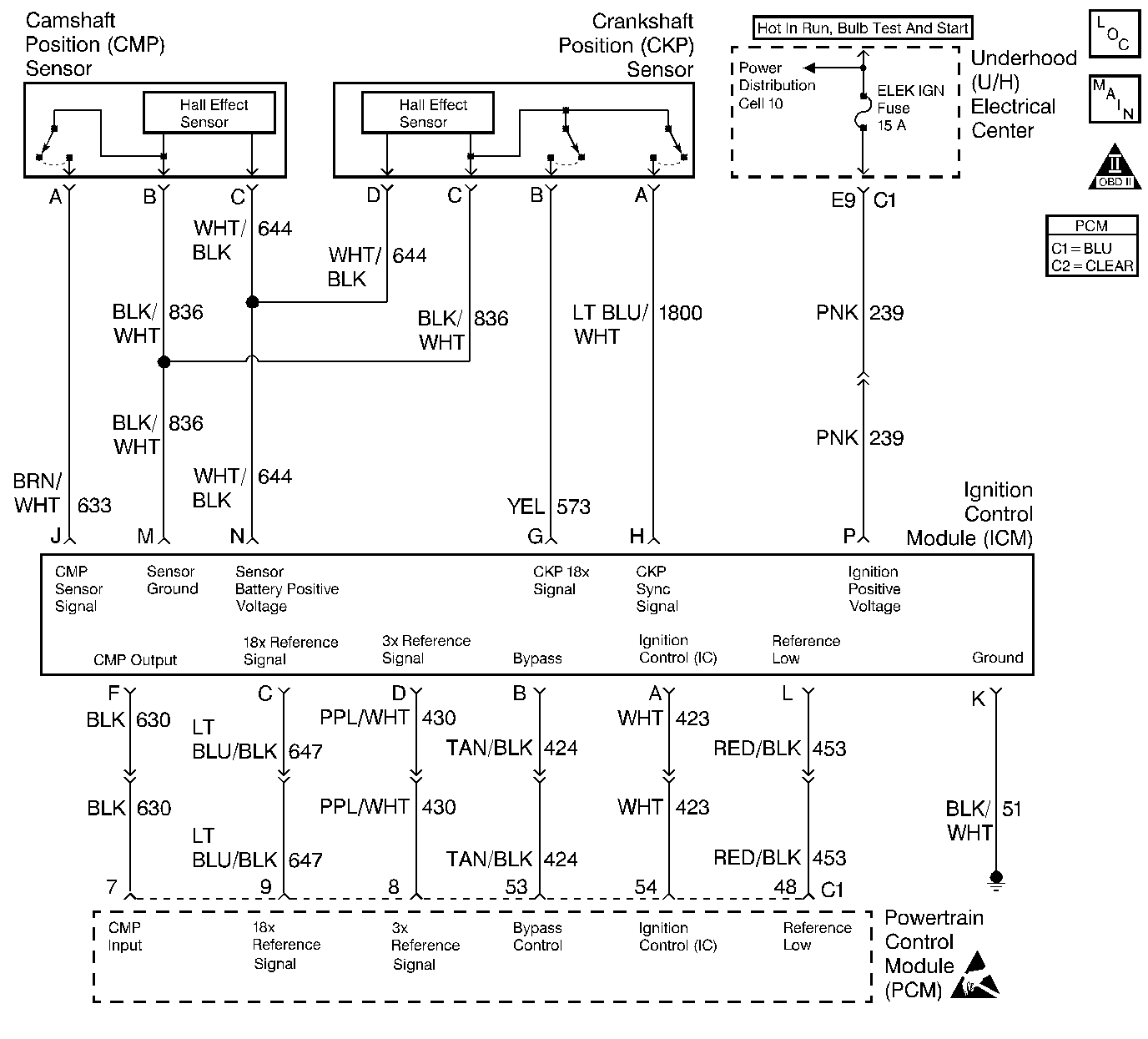
Circuit Description
The PCM continuously sends ignition control (IC) spark timing pulses to the ICM on the Ignition Control (IC) circuit. However, during start-up, the ignition control module (ICM) grounds the IC spark timing pulses, and maintains spark timing fixed at 10° BTDC. The fixed spark timing is maintained until the engine speed is above a specific RPM and the PCM receives a calibrated number of 3X reference pulses from the ICM (Bypass Mode). Once the PCM receives the 3X reference pulses, the PCM applies 5 volts to the ICM on the Bypass circuit. The bypass voltage signals the ICM to transfer ignition control (IC) spark timing to the PCM (IC Mode). The ICM switches the IC pulses from ground allowing the PCM to control spark timing. If the PCM detects a short to voltage in the Bypass circuit, DTC P1362 will set. A short to ground in the IC circuit or Bypass circuit will cause both DTC P1361 and DTC P1362 to set. The engine will start and may run in Bypass mode timing (spark timing fixed at 10°BTDC).
Conditions for Running the DTC
The engine is running.
Conditions for Setting the DTC
The PCM detects a short to voltage in the Bypass circuit.
Action Taken When the DTC Sets
| • | The PCM will illuminate the MIL during the second consecutive trip in which the diagnostic test has been run and failed. |
| • | The PCM will store conditions which were present when the DTC set as Freeze Frame and Fail Records data. |
Conditions for Clearing the MIL/DTC
| • | The PCM will turn the MIL OFF during the third consecutive trip in which the diagnostic has been run and passed. |
| • | The history DTC will clear after 40 consecutive warm-up cycles have occurred without a malfunction. |
| • | The DTC can be cleared by using the scan tool Clear Info function or by disconnecting the PCM battery feed. |
Diagnostic Aids
Check for the following conditions:
| • | Poor connection at the PCM. |
| Inspect harness connectors for backed out terminals, improper mating, broken locks, improperly formed or damaged terminals, and poor terminal to wire connection. |
| • | Damaged harness. |
| Inspect the wiring harness for damage. If the harness appears to be OK, disconnect the ICM, turn the ignition ON and observe a digital multimeter connected between the IC circuit and B+ while moving connectors and wiring harnesses related to the ICM. A change in voltage will indicate the location of the malfunction. |
Reviewing the Fail Records vehicle mileage since the diagnostic test last failed may help determine how often the condition that caused the DTC to be set occurs. This may assist in diagnosing the condition.
Step | Action | Value(s) | Yes | No | ||||||
|---|---|---|---|---|---|---|---|---|---|---|
1 | Was the Powertrain On Board Diagnostic (OBD) System Check performed? | -- | ||||||||
2 | Is DTC P1361 set also? | -- | ||||||||
3 |
Is the test light ON? | -- | ||||||||
4 |
Is the test light ON? | -- | ||||||||
5 | Locate and repair the short to voltage in the BYPASS circuit. Refer to Repair Procedures in Wiring Repairs . Is action complete? | -- | -- | |||||||
6 |
Is the test light ON? | -- | ||||||||
7 | Locate and repair the short to ground in the IC circuit. Refer to Repair Procedures in Wiring Repairs . ion complete? | -- | -- | |||||||
8 |
Is the test light ON? | -- | ||||||||
9 | Locate and repair the short to ground in the BYPASS circuit. Go to Repair Procedures in Wiring Repairs . Is action complete? | -- | -- | |||||||
10 |
Was a problem found? | -- | ||||||||
11 |
Does the resistance switch from below the first value to above the second value? | 500 ohms 5000 ohms | ||||||||
12 | Replace the Ignition Control Module. Refer to Ignition Control Module Replacement . Is action complete? | -- | -- | |||||||
13 | Replace the PCM. Important: Replacement PCM must be reprogrammed. Refer to Powertrain Control Module Replacement/Programming . Is action complete? | -- | -- | |||||||
14 |
Does the scan tool indicate DTC 1362 failed this ignition? | -- | System OK |
